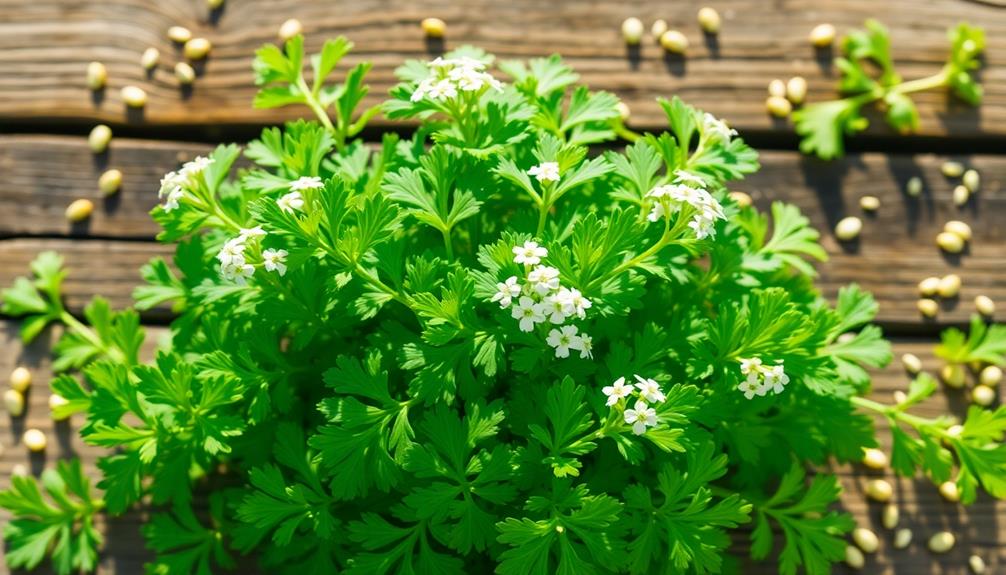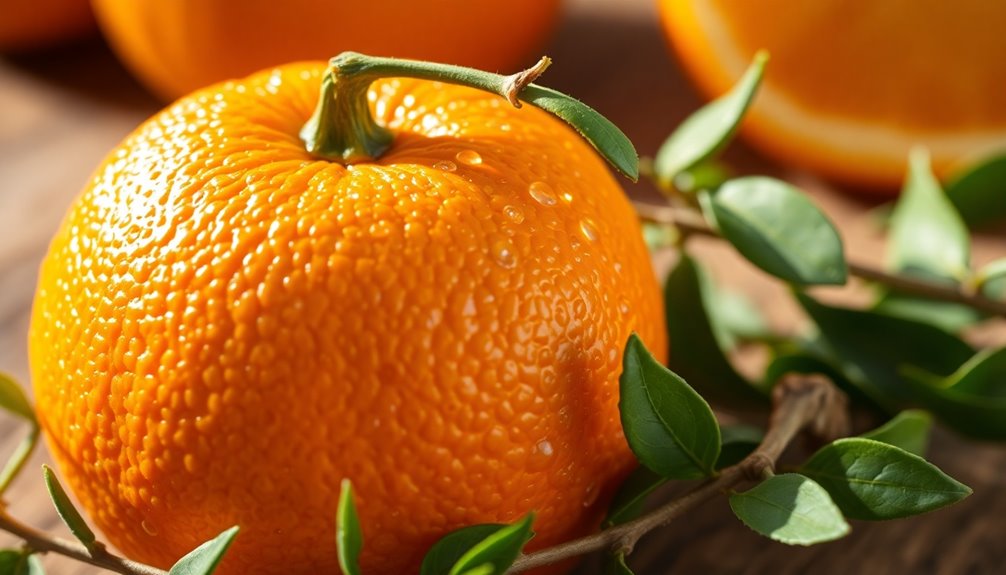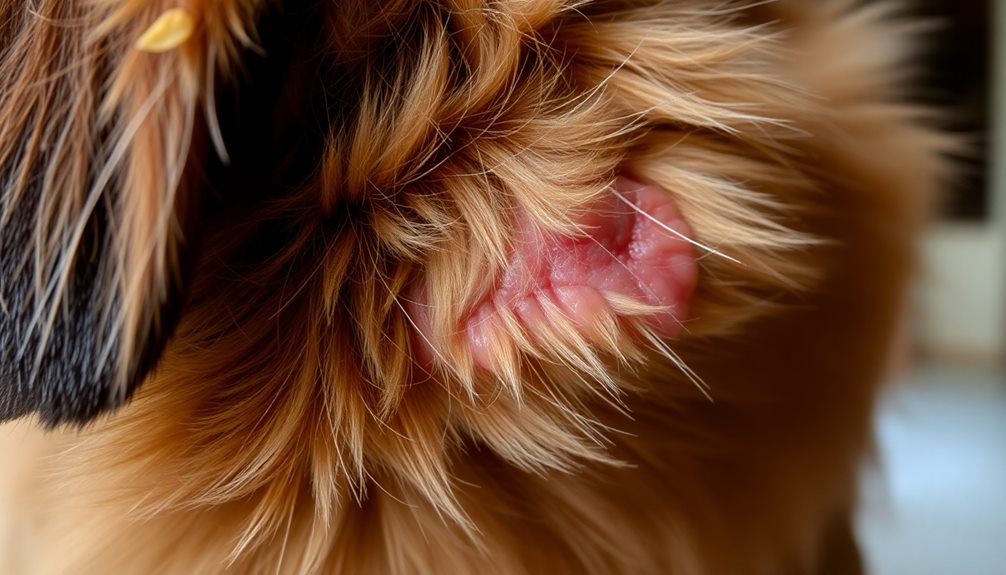Coriander smells warm and spicy, mixing herbaceous notes with bright hints of citrus and subtle nuttiness. You might notice that the scent varies depending on whether you're smelling fresh cilantro or crushed coriander seeds. The fresh leaves have a lively, energizing aroma, while the seeds give off a cozy, complex fragrance that enhances meals, especially in Middle Eastern and Indian dishes. This captivating aroma can spark memories of home-cooked meals, too! If you're curious about how this delightful scent can impact your cooking or daily life, there's more to explore about its fascinating world.
Key Takeaways
- Coriander has a warm, spicy, and herbaceous aroma with nutty and citrusy hints, creating a complex fragrance profile.
- The scent of crushed coriander seeds is more pronounced, enhancing its sweetness and spice, especially in cooking.
- Fresh cilantro offers a distinctively bright and fragrant smell, contrasting with the spiciness of coriander seeds.
- Coriander's aroma can evoke feelings of nostalgia, warmth, and togetherness, particularly in Mediterranean and Middle Eastern cultures.
- Genetic variations can influence individual perceptions of coriander's scent, leading to contrasting experiences among different people.
Introduction
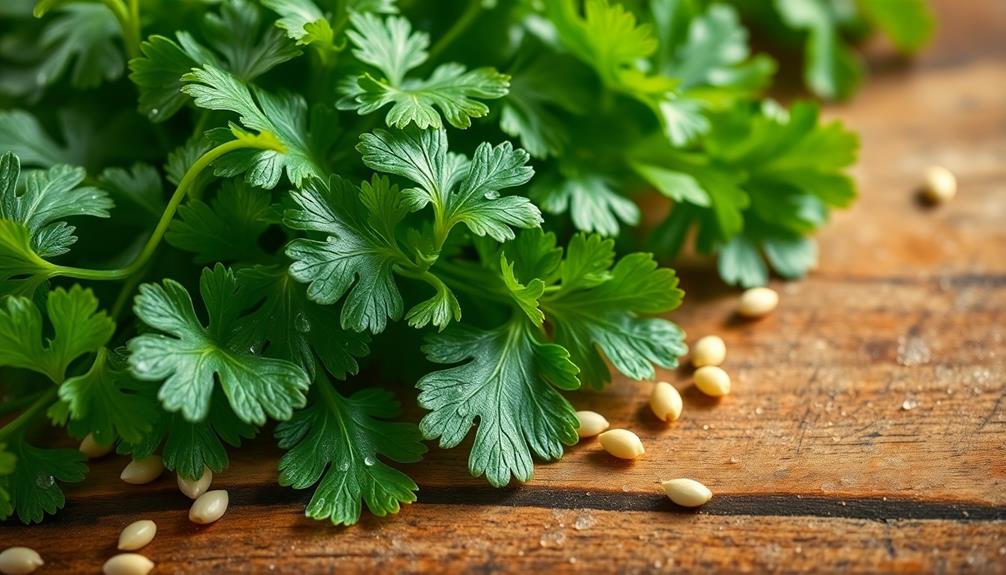
Coriander's distinct aroma has fascinated many, blending warm, spicy, and herbaceous notes with a hint of citrus and nuttiness. As you explore this versatile plant, you'll discover how its essential oil brings a complex aroma to life. The main component, linalool, plays a big role in creating its unique fragrance.
Additionally, the herbal benefits of coriander can complement various health practices, including those involving herbal tea benefits. You might notice that the aromatic leaves of coriander, often called cilantro, offer a bright and fragrant smell that can be polarizing. This means some people love it, while others may not enjoy it at all! It's interesting how our genetics can influence our taste and scent perception.
Coriander is commonly used in various fragrance families, including aromatic, oriental, and citrus aromatic. This versatility allows it to enhance both floral and spicy scent profiles, making it a valuable ingredient in perfumery.
Whether you're cooking with fresh coriander or enjoying the delightful aroma of its essential oil, you're experiencing a scent that adds depth and richness to many creations. So next time you catch a whiff of coriander, take a moment to appreciate its delightful, slightly citrusy fragrance and the complexity it brings to the world around you!
Description of the Smell
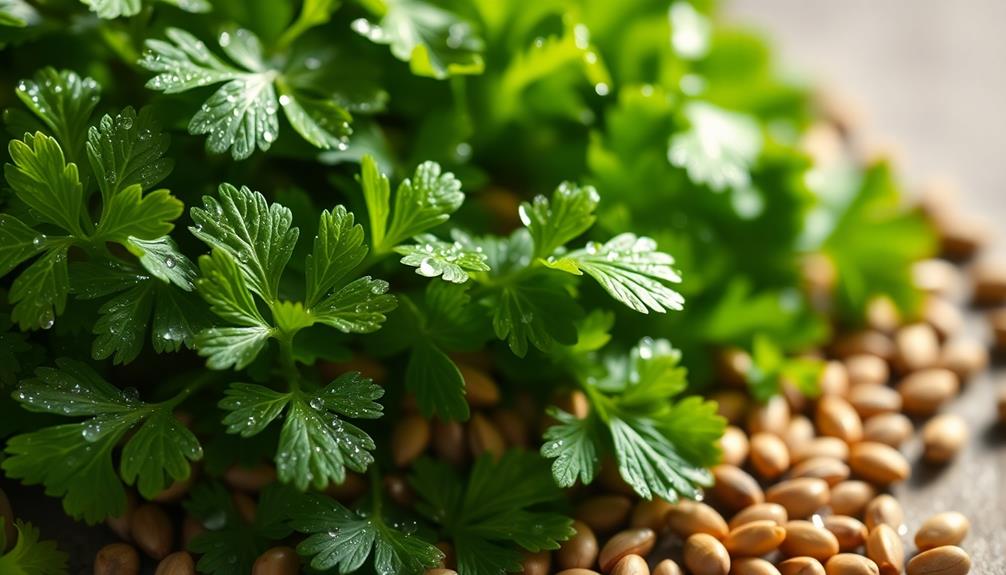
The aroma of coriander is a fascinating blend that captivates the senses. It carries a warm, spicy aroma, often described as herbaceous and nutty, which adds depth to its fragrance. When you smell coriander seeds, you're greeted with a complex aroma profile that hints at sweetness and spice. The essential oil extracted from these seeds has notes of linalool, enhancing its warm character.
Additionally, the unique scent profile of coriander can provide natural antibacterial benefits, making it a useful addition in various applications, including unlocking aromatic cleaning power.
Now, let's not forget cilantro—the fresh leaves of coriander. They offer a distinct fragrant, citrusy smell that contrasts beautifully with the spiciness of the seeds. You might find yourself enjoying the bright, fresh scent of cilantro while cooking, bringing a burst of energy to your dishes.
Interestingly, the scent of coriander has even been compared to bedbugs, thanks to its Greek roots; "koris," meaning bug, adds a quirky twist to its olfactory story.
People have used coriander in traditional medicine for centuries, appreciating its unique scent and health benefits. So, whether you're using coriander seeds in your cooking or savoring the fresh smell of cilantro, you're experiencing a remarkable and memorable aroma that lingers in the air.
Source and Composition
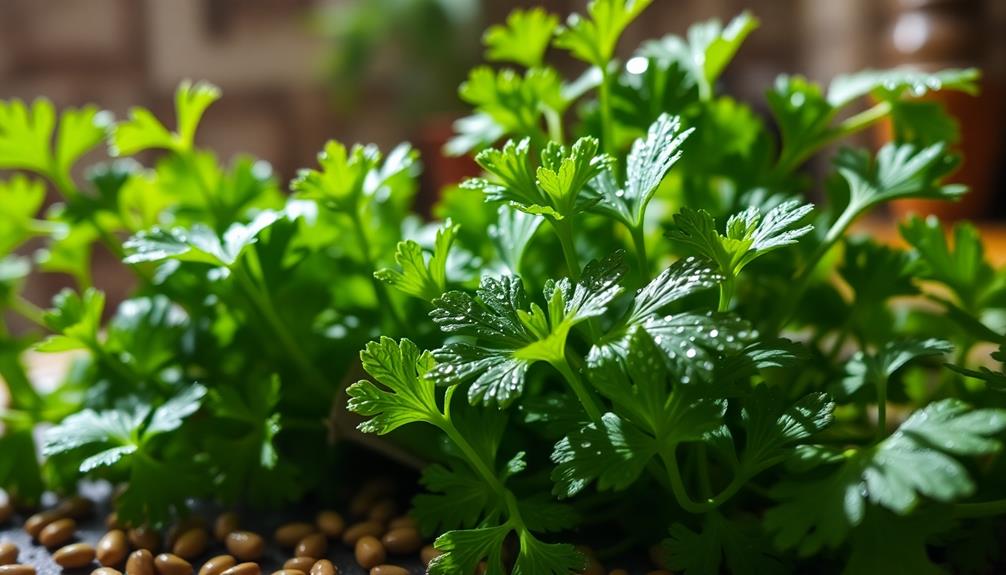
Exploring the source and composition of coriander reveals the intricate elements that contribute to its captivating aroma. At the heart of this scent is coriander essential oil, which carries warm, spicy, and herbaceous notes that create its distinctive aroma profile.
One key player in this aromatic dance is linalool, a compound that adds freshness and invigorating qualities to the scent. Regular cleaning of air purifiers can also enhance the freshness of the air, allowing you to better appreciate the nuances of fragrances like coriander optimal purifier maintenance.
But there's more to coriander's fragrance! It also includes various aldehydes, especially (E)-2-alkenals, which bring fruity and pungent undertones. You might notice that some people describe coriander with a soapy aroma. This contrasting perception comes from genetic differences in olfactory receptors, showing just how unique our sense of smell can be!
In the world of perfumery, coriander is a star ingredient. It's often blended with woods, ferns, and citrus notes, creating refreshing fragrance accords that make scents truly unforgettable.
Typical Scenarios or Environments
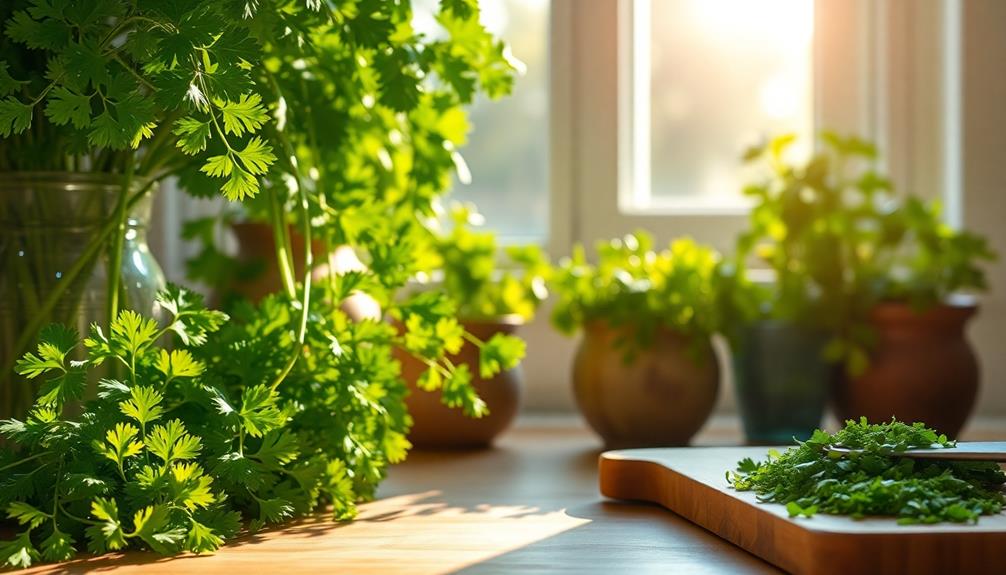
When you step into a bustling kitchen, the aroma of crushed coriander seeds can instantly transport you to a world of vibrant flavors. Imagine the warm, spicy scent filling the air as it mingles with other ingredients.
Coriander is often used in traditional dishes, especially in Middle Eastern and Indian cuisines. You might find it enhancing curries and pickles, bringing a unique twist to every bite.
In culinary environments, the smell really comes alive when the seeds are crushed or roasted. That's when the spicy and slightly citrusy aroma bursts forth, inviting you to taste the delicious creations around you.
You can even catch a whiff of fresh cilantro, which shares a family connection with coriander, adding another layer to your sensory experience.
Whether you're enjoying a homemade meal or exploring a local market, the captivating aroma of coriander is hard to miss. It's not just a spice; it's a key ingredient that awakens your taste buds, reminding you of the rich traditions behind every dish.
Emotional or Cultural Associations

With its distinctive aroma, coriander evokes a sense of nostalgia and warmth, connecting you to rich culinary traditions. When you catch a whiff of coriander leaves, it might remind you of home-cooked meals shared with family.
The herb's unique scent brings back memories of bustling kitchens, where laughter and delicious food fill the air. In many Mediterranean and Middle Eastern cultures, coriander symbolizes togetherness, making meals feel special and inviting.
This nostalgic connection runs deep, as the smell of coriander often sparks memories of childhood and cherished recipes passed down through generations. You may recall your grandmother's famous dish, infused with that wonderful aroma, bringing everyone to the table.
Coriander's distinctive scent also finds its place in perfumery, where it evokes feelings of vitality and sophistication. Its fresh, spicy notes appeal to all, adding a touch of elegance to fragrances.
Health or Safety Considerations
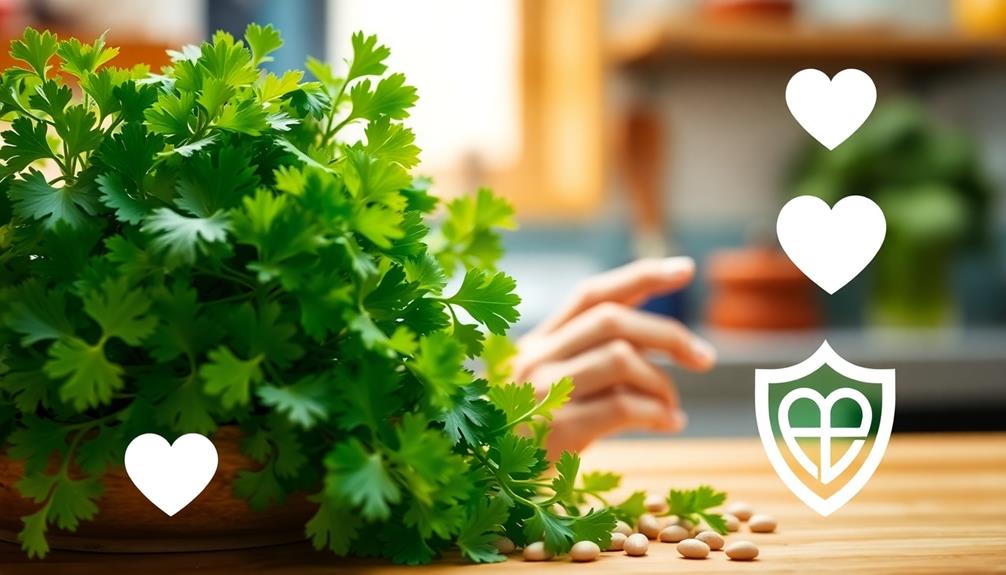
Coriander and its fresh counterpart, cilantro, are generally safe and enjoyed by many, but it's important to be aware of potential health and safety considerations. While both are tasty additions to your meals, some people may experience allergic reactions. If you're one of those who find cilantro's aroma off-putting, it might be due to genetic factors, so don't feel bad about it!
Coriander is known for its possible anti-inflammatory properties, which means it might help reduce swelling and pain. Cilantro, on the other hand, may provide antioxidant effects that are good for your skin and overall health.
However, to ensure your safety and enjoyment, be careful about your consumption. Always check for specific allergies before trying these herbs, and remember that freshness matters! Store coriander seeds in a cool, dry place to keep them effective, and choose fresh cilantro with vibrant green leaves to avoid spoilage and foodborne illnesses.
Incorporating coriander and cilantro into your diet can be beneficial, just be mindful of any reactions you might have. Enjoy these flavorful herbs while keeping safety in mind!
Final Thoughts
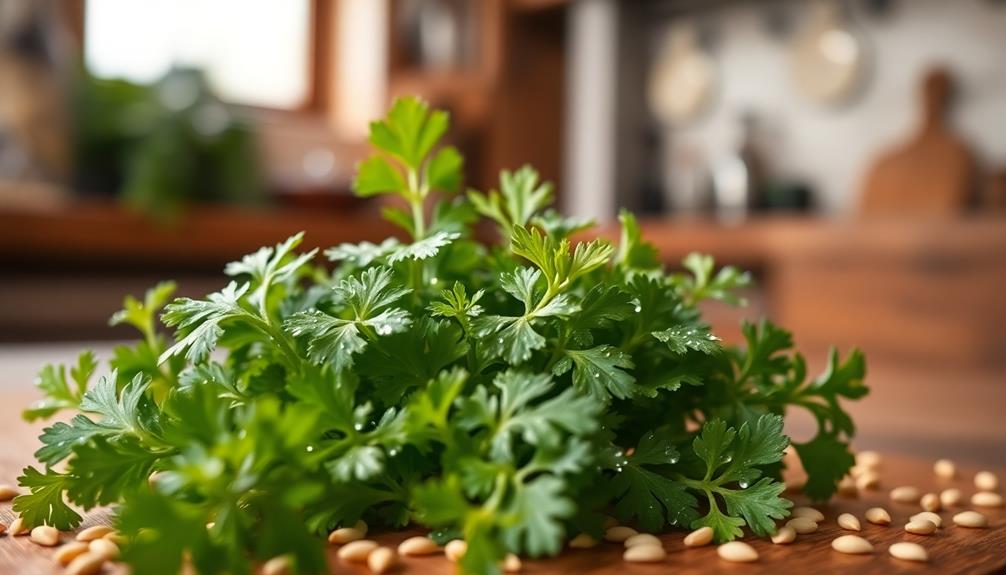
Often, the enchanting aroma of coriander can elevate your culinary experiences and personal care routines. This warm, spicy, and slightly citrusy scent isn't just a treat for your taste buds; it also adds a delightful twist to your daily life. When you explore how coriander is used, you'll discover its versatility in countless dishes across various culinary traditions, from Indian curries to Mexican salsas.
Moreover, the essential oil extracted from coriander seeds enhances its aromatic profile with complex notes, thanks to linalool. This makes it a favorite in perfumery, where it brings freshness and liveliness to both masculine and feminine fragrances. Imagine walking through a garden filled with these invigorating scents, blended with ginger, cardamom, or bergamot!
Coriander's distinct aroma isn't just about fragrance; it also boasts medicinal properties that may promote well-being.
So, whether you're cooking a meal or selecting a new fragrance, don't underestimate the power of coriander. By integrating this wonderful aroma into your life, you can create an atmosphere that's not only pleasing but also enriching.
Embrace the magic of coriander, and let its scent enhance your everyday experiences!
Frequently Asked Questions
Does Coriander Smell Good?
You might find that coriander smells good, as its warm, spicy, and herbaceous aroma often appeals to many. However, personal preferences vary, and some may perceive it differently based on their unique scent experiences.
How Would You Describe the Smell of Cilantro?
When you smell cilantro, you'll notice a fresh, citrusy aroma that feels bright and herbaceous. While many find it delightful, others might pick up soapy notes due to their unique genetic makeup.
Is Coriander the Same as Cilantro?
No, coriander isn't the same as cilantro. Cilantro refers to the fresh leaves and stems, while coriander typically means the dried seeds. They have distinct flavors and aromas, so they're used differently in cooking.
What Perfume Smells Like Coriander?
If you're looking for perfumes that smell like coriander, try Dior's "Poison" or Tom Ford's "Vanille Fatale." These fragrances highlight coriander's warm, spicy notes, creating a unique scent experience you won't forget.
